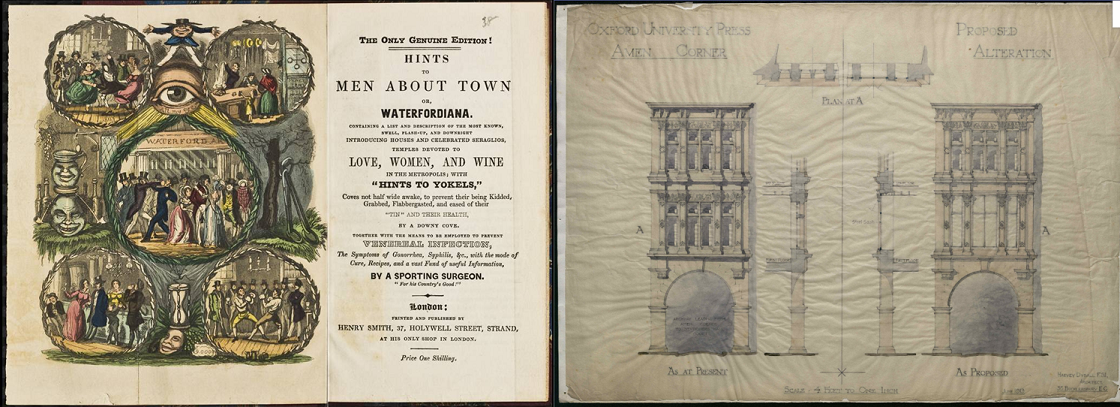*The Library has now purchased access to Literary Print Culture: The Stationers’ Company Archive. See New to the Library: Literary Print Culture.*
We currently have trial access to Literary Print Culture: The Stationers’ Company Archive and London Low Life, two fascinating primary source databases from Adam Matthew.
So if you’re interested in the history of the book or of publishing, working and social lives in Victorian London, history of copyright, police and criminality in the 19th century, the workings of an early London Livery Company, commerce in London and more, then there may be something here for you.

Left: Hints to men about town, or, Waterfordiana: containing a list and description of the most known,swell, flash-up, and downright introducing houses and celebrated seraglios … with the means employed to prevent venereal infection … / by a sporting surgeon (1830s) from London Low Life. Right: Architectural plan for Oxford University Press, Amen Corner (1913) from Literary Print Culture.
Both databases can be accessed via the E-resources trials page.
Access is available on and off-campus.
Trial access for both databases ends 12th March 2018.
Literary Print Culture: The Stationers’ Company Archive, 1554-2007
*The Library has now purchased access to this resource. See New to the Library: Literary Print Culture*

The Stationers’ Company Archive is one of the most important resources for understanding the workings of the early book trade, the printing and publishing community, the establishment of legal requirements for copyright provisions and the history of bookbinding. Sourced from the archive of The Worshipful Company of Stationers & Newspaper Makers this resource allows access to a vast and unique collection of primary source documents.

Court book k, 1 Feb 1938 – 3 Jul 1945, p. 239 showing bomb damage to Stationers’ Hall, located on Ave Maria Lane in the City of London, in 1940 during the Second World War. From Literary Print Culture.
Collection highlights include Entry Book of Copies (1554-1842) which were used to establish copyright belonging to publishers, booksellers and eventually authors until the introduction of automatic copyright in 1912. Membership records from 1555 to 1940, court records from 1602 to 1982, English Stock documents (1603-1961) which recorded the activities of the successful publishing arm of the Stationers’ Company and Treasurers’ vouchers (1734-1800) which detailed English Stock payments for printing, paper and advertising almanacs and other English Stock books.
London Low Life: Street Culture, Social Reform and the Victorian Underworld

This digital collection brings to life the teeming streets of Victorian London, inviting you to explore the gin palaces, brothels and East End slums of the nineteenth century’s greatest city. From salacious ‘swell’s guides’ to scandalous broadsides and subversive posters, the material sold and exchanged on London’s bustling thoroughfares offers an unparalleled insight into the dark underworld of the nineteenth century city. Children’s chapbooks, street cries, slang dictionaries and ballads were all part of a vibrant culture of street literature.

Police evidence illustrated (n.d.) from London Low Life.
Material includes fast literature, street ephemera (posters, advertising, playbills, ballads and broadsides), penny fiction, cartoons, chapbooks, street cries, swell’s guides to London prostitution, gambling and drinking dens, reform literature and maps and views of London.
Access both of these databases via e-resources trials.
Access is available until 12th March 2018.
Feedback welcome.
PDF download options are not available during trials.
You can access other primary source databases the Library already has access to, including 11 Adam Matthew Digital databases, via the Primary Sources database list.
Access is only available to current students and staff at University of Edinburgh.
Caroline Stirling – Academic Support Librarian for History, Classics and Archaeology
